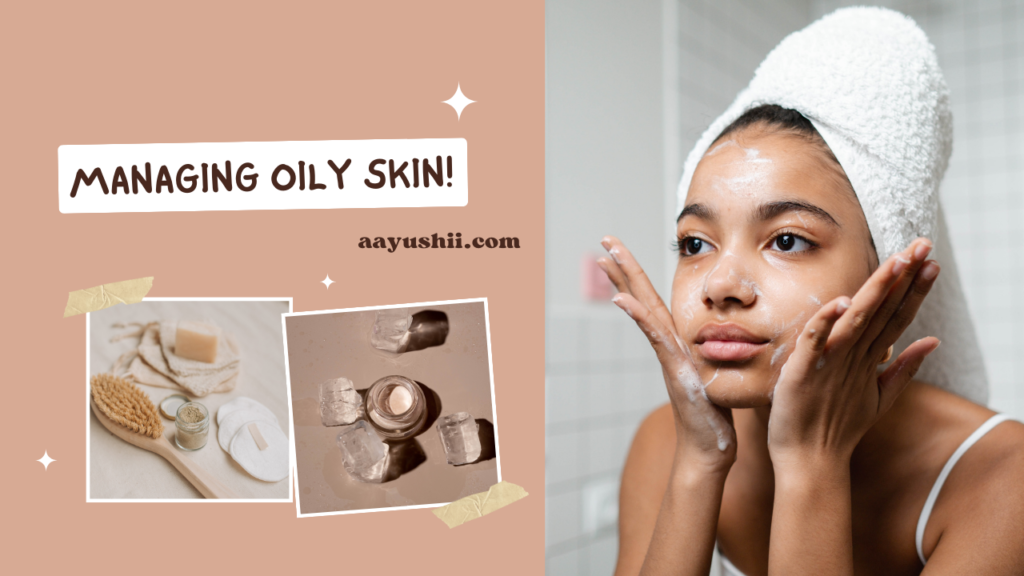Water is often described as the essence of life, and its significance goes beyond basic survival to influence every aspect of health—including the skin. Hydration and skin are deeply interconnected, with water playing a vital role in maintaining skin elasticity, reducing inflammation, and supporting its natural glow. While topical products often take center stage in skincare routines, the importance of internal hydration is equally, if not more, impactful. This article explores the science-backed relationship between water intake and skin health, revealing how proper hydration can enhance skin appearance, slow aging, and promote overall well-being.
Understanding Skin Anatomy and Its Hydration Needs
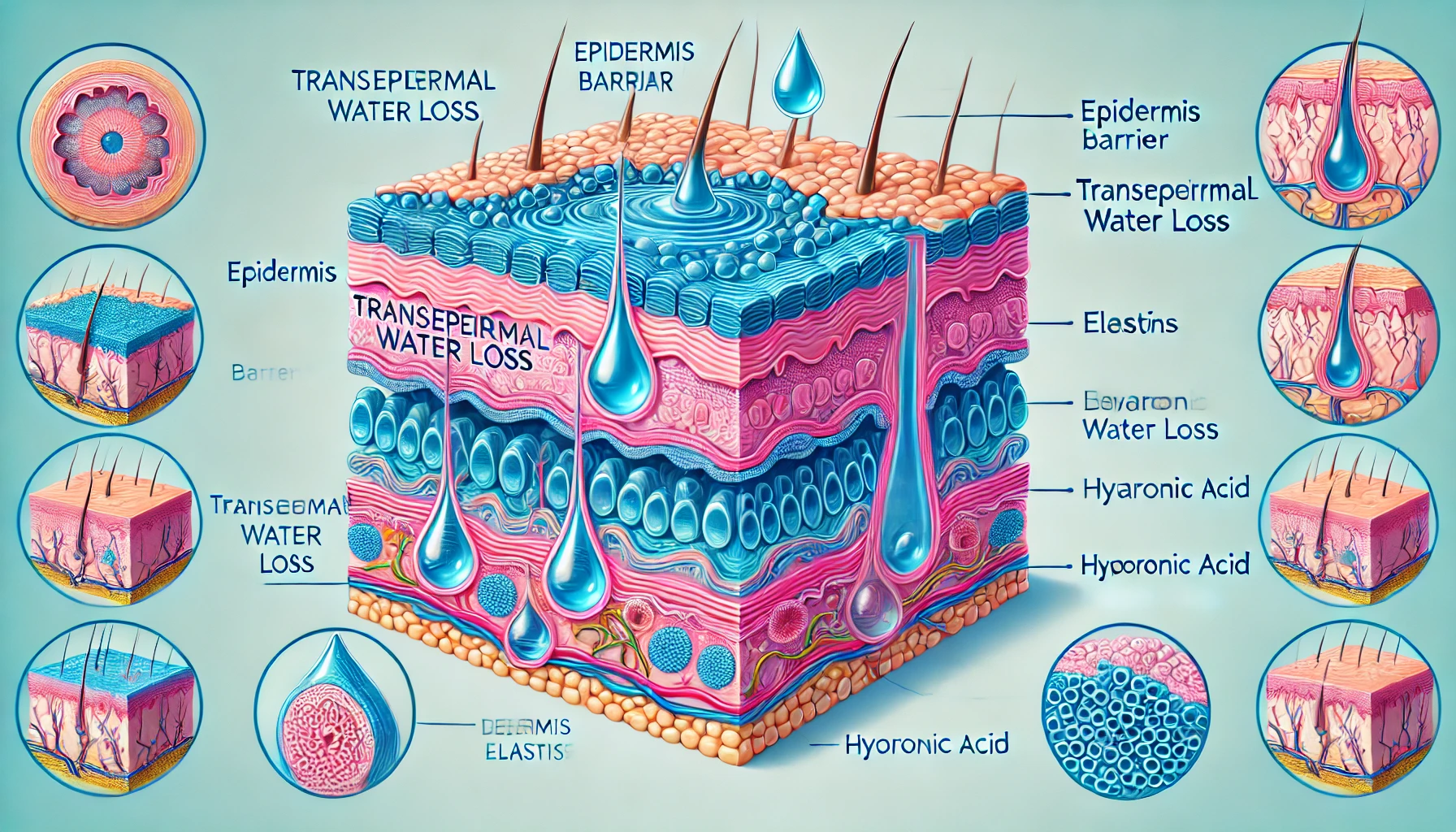
The skin is the body’s largest organ, accounting for roughly 16% of your total body weight. It serves as a protective barrier against environmental aggressors, regulates temperature, and enables sensory perception. Structurally, the skin is composed of three main layers:
- Epidermis (Outer Layer): This is the skin’s waterproof barrier, rich in keratinocytes. It plays a critical role in retaining moisture and preventing transepidermal water loss (TEWL).
- Dermis (Middle Layer): This layer contains collagen, elastin, and hyaluronic acid, responsible for elasticity, firmness, and hydration retention.
- Hypodermis (Deepest Layer): Composed mainly of fat, it provides insulation and supports the layers above.
Each layer relies on proper hydration to perform optimally. Water intake directly influences these structures, with the dermis acting as a reservoir that supplies water to the outer layers. A reduction in hydration at any level leads to compromised skin function and appearance.
Scientific Evidence Linking Water and Skin Health
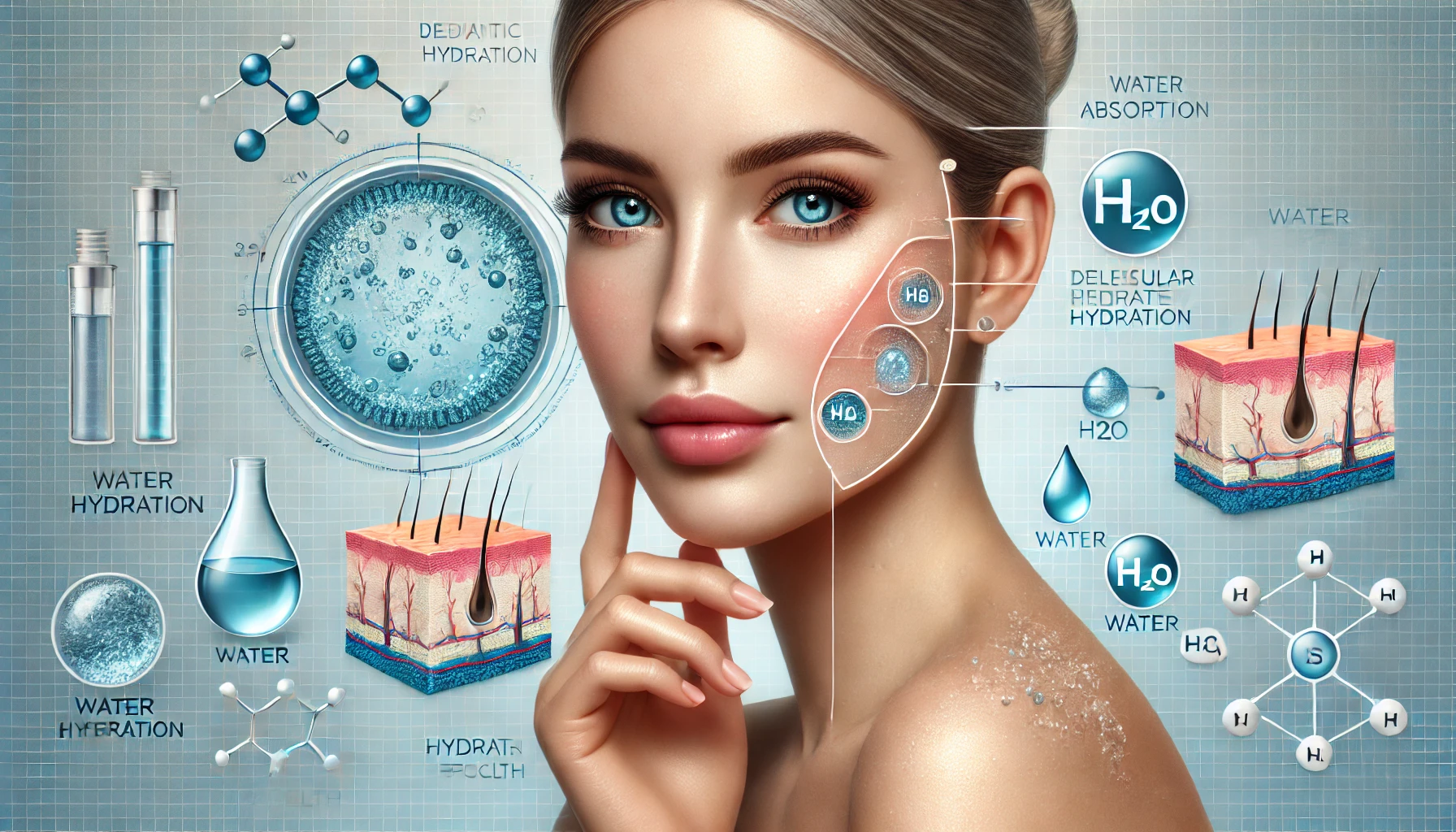
1. Cellular Function and Hydration
Water is the primary component of skin cells. It supports intracellular processes, maintains cell volume, and ensures efficient nutrient transport and waste removal. When hydration levels drop, cells shrink and lose their structural integrity, leading to visibly dry, flaky, and irritated skin.
Research Insight:
A 2015 study published in Clinical, Cosmetic, and Investigational Dermatology demonstrated that individuals with low daily water intake who increased their consumption experienced significant improvements in skin hydration and elasticity. This suggests that water plays a pivotal role in maintaining skin suppleness and resilience.
2. Water and Collagen Preservation
Collagen is the most abundant protein in the dermis, forming the scaffolding that keeps skin firm and youthful. Adequate hydration preserves the structural integrity of collagen, preventing premature aging and sagging.
Scientific Backing:
Collagen fibers absorb and retain water to maintain their elasticity. A study in the Journal of Cosmetic Dermatology highlighted that dehydration accelerates collagen breakdown, increasing susceptibility to wrinkles and loss of firmness.
3. Detoxification Through Hydration
Water aids the body’s detoxification processes by supporting the kidneys and liver in eliminating toxins. These toxins, when not removed efficiently, can manifest as skin problems such as acne, dullness, and inflammation. Drinking water ensures these organs function optimally, indirectly benefiting the skin.
Fact:
A hydrated system reduces the concentration of harmful metabolites in the bloodstream, lowering the likelihood of skin flare-ups and promoting a clear complexion.
4. Impact on Blood Circulation
Proper hydration enhances blood circulation, ensuring that skin cells receive essential oxygen and nutrients. Improved blood flow not only aids in cell repair and regeneration but also contributes to a natural, healthy glow.
Evidence:
A 2020 study in Frontiers in Physiology confirmed that hydration significantly improves microcirculation, positively affecting skin tone and overall appearance.
Dehydration: A Skin Stressor
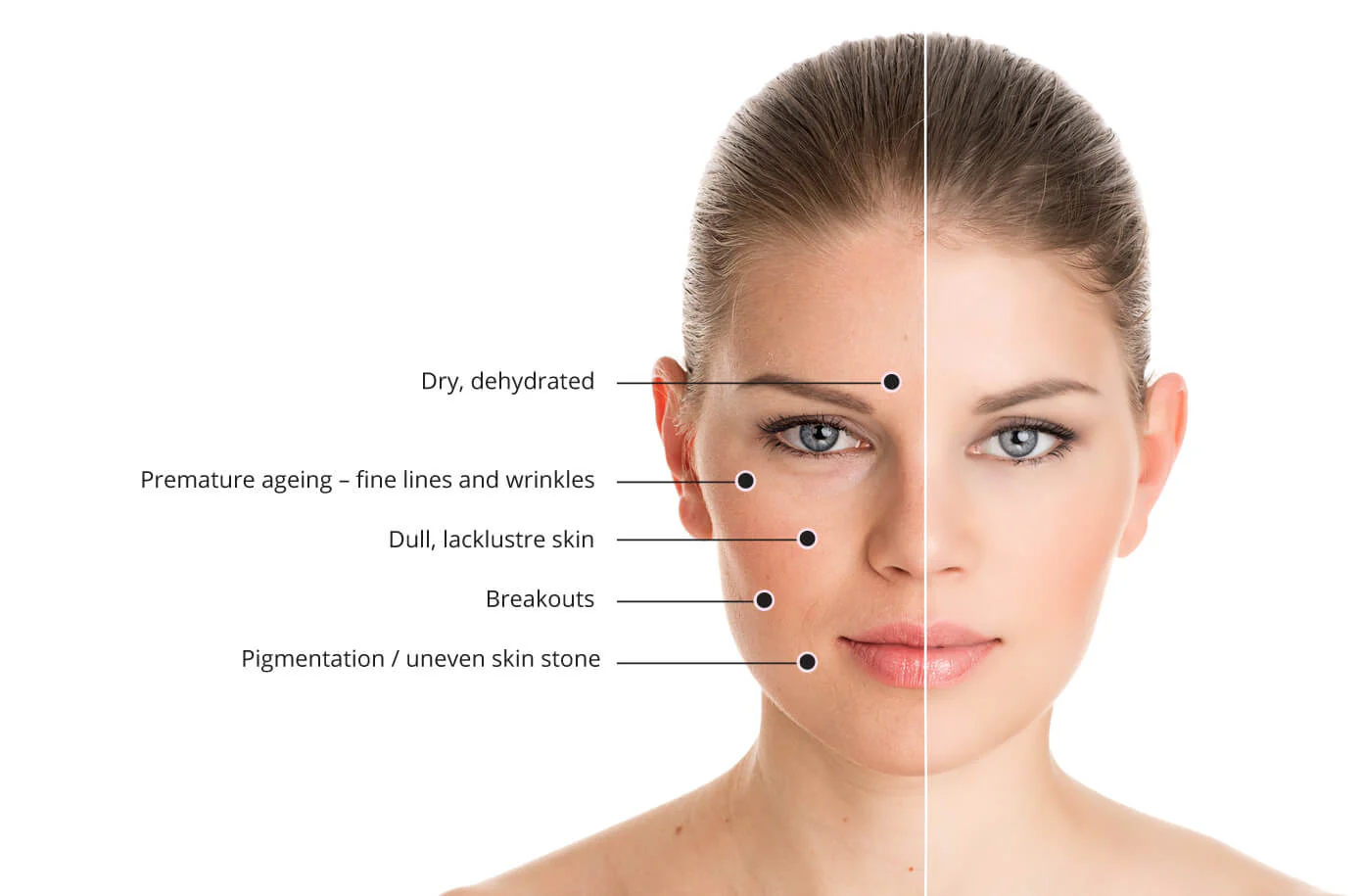
Dehydrated skin is often confused with dry skin, but they are distinct conditions. While dry skin is a lack of oil (lipids), dehydrated skin lacks water. Dehydration can be caused by insufficient water intake, environmental factors like low humidity, excessive alcohol or caffeine consumption, or strenuous physical activity.
Signs of Dehydrated Skin:
- Tightness and discomfort.
- Increased visibility of fine lines and wrinkles.
- Flakiness and rough texture.
- Redness or irritation due to a weakened barrier.
- Dull, uneven complexion.
Chronic dehydration not only affects the appearance of your skin but also compromises its barrier function, making it more prone to damage and infections.
How Much Water Does Your Skin Need?
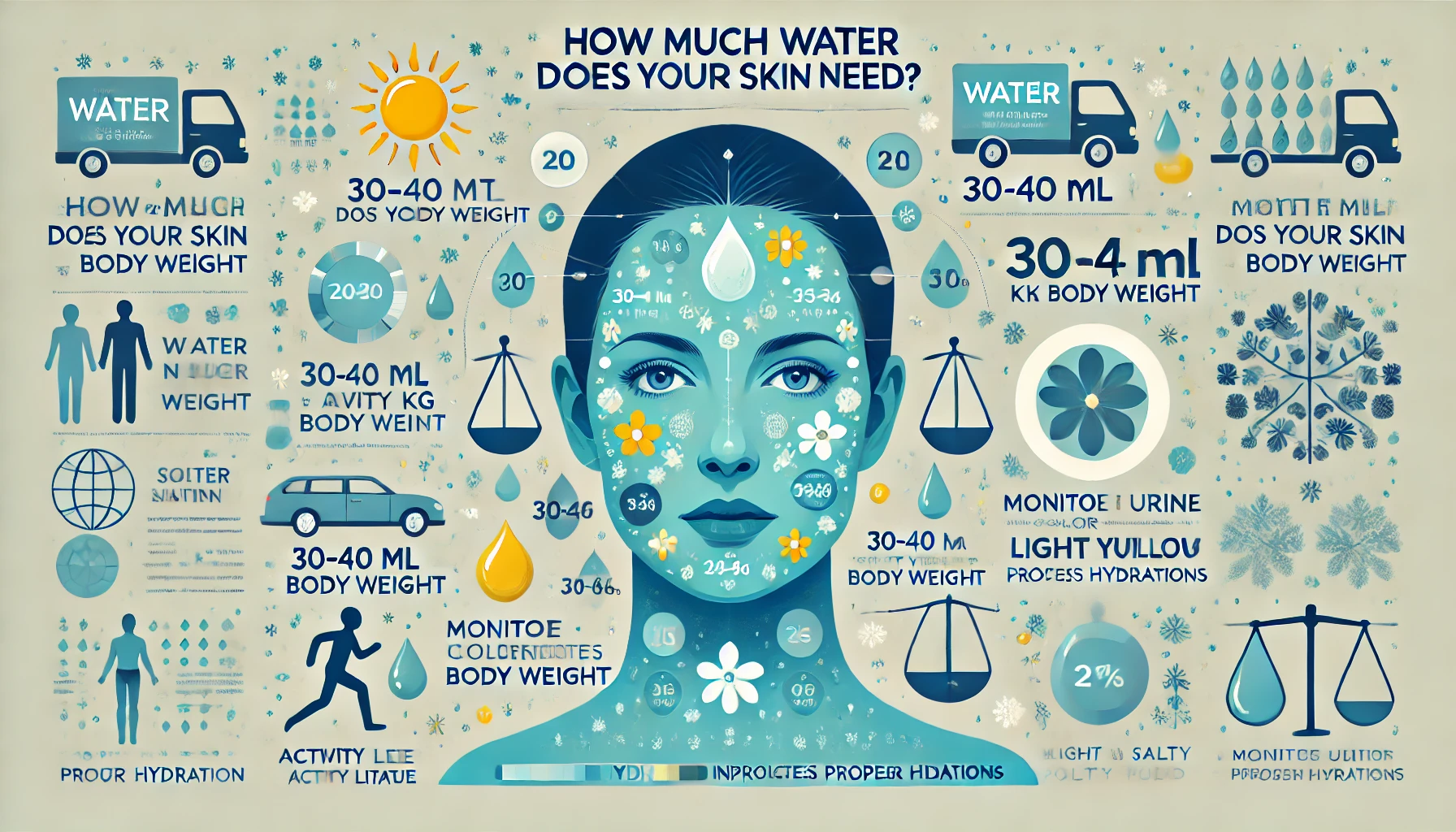
The commonly recommended “8 glasses a day” is a convenient guideline, but it doesn’t account for individual differences in body size, lifestyle, and environment. Hydration needs vary based on several factors, and understanding these can help you determine how much water your skin truly requires.
1. Body Weight: A Key Determinant of Hydration Needs
Your body weight directly influences how much water you need. Larger bodies require more water to maintain essential physiological functions, including skin hydration. The general rule of thumb is to drink 30–40 milliliters of water per kilogram of body weight.
Example Calculation:
- A person weighing 70 kg would need approximately 2.1 to 2.8 liters of water daily.
- This calculation provides a more personalized estimate than the one-size-fits-all “8 glasses a day” rule.
Why It Matters for Skin:
Proper hydration ensures that your skin cells remain plump and functional, supporting a smooth, hydrated appearance.
2. Activity Level: Adjusting for Physical Exertion
Engaging in intense physical activity or exercise increases water loss through sweat. This means you need to replenish the water lost during these activities to avoid dehydration.
Guidelines for Active Individuals:
- Drink 500 ml (about 2 cups) of water 2 hours before exercise.
- Sip water during workouts to stay hydrated, especially in prolonged or high-intensity sessions.
- Replenish with additional water post-exercise, particularly if you’ve sweated heavily.
Why It Matters for Skin:
Dehydration from exercise can leave your skin looking dull and flaky. Rehydrating restores moisture levels and helps flush out toxins that may accumulate during physical exertion.
3. Climate: Hot, Arid Environments Lead to Faster Dehydration
Living in or traveling to hot, dry, or humid environments significantly increases water loss through sweat and evaporation. Similarly, exposure to air conditioning or heating can dry out the skin by reducing ambient humidity.
How to Adapt:
- Increase your water intake during hot weather or in arid climates to account for the additional loss.
- Use a humidifier indoors to retain moisture in the air and reduce skin dehydration.
- Drink water even if you don’t feel thirsty in extremely hot climates, as thirst might not be a reliable indicator.
Why It Matters for Skin:
Hot climates and dry air can lead to increased transepidermal water loss (TEWL), making your skin appear dull and flaky. Drinking extra water helps replenish lost fluids and keeps your skin hydrated from the inside out.
4. Dietary Habits: Sodium and Fruits/Veggies Influence Hydration
What you eat significantly affects your hydration levels. Diets high in sodium (salt) can lead to water retention in the body, paradoxically causing dehydration symptoms at a cellular level. Similarly, low intake of fruits and vegetables can deprive your body of natural hydration sources.
Recommendations:
- Reduce Sodium Intake: Opt for fresh, whole foods instead of processed snacks high in salt.
- Eat Hydration-Rich Foods: Include water-dense fruits and vegetables like cucumber, watermelon, and oranges in your meals.
- Balance Electrolytes: Combine water intake with foods rich in potassium (e.g., bananas) to counteract sodium’s dehydrating effects.
Why It Matters for Skin:
High-sodium diets can make your skin appear puffy and tired, while water-rich foods help hydrate and nourish your skin with essential vitamins and antioxidants.
Pro Tip: Listening to Your Body’s Thirst Signals
Your body has a natural mechanism to indicate when it needs water: thirst. While this is a helpful guide, it’s not always the most reliable—especially for older adults or people in hot climates, where thirst may lag behind dehydration.
Using Urine Color as an Indicator:

- Light Yellow or Clear: Indicates proper hydration.
- Dark Yellow or Amber: Suggests dehydration and the need to drink more water.
- Very Clear/Colorless: May indicate overhydration, which can dilute essential minerals.
Why It Matters for Skin:
Dehydration often manifests in the skin as dryness, tightness, or fine lines. By listening to thirst signals and monitoring urine color, you can maintain adequate hydration, ensuring that your skin remains healthy and vibrant.
Water-Rich Foods for Skin Hydration
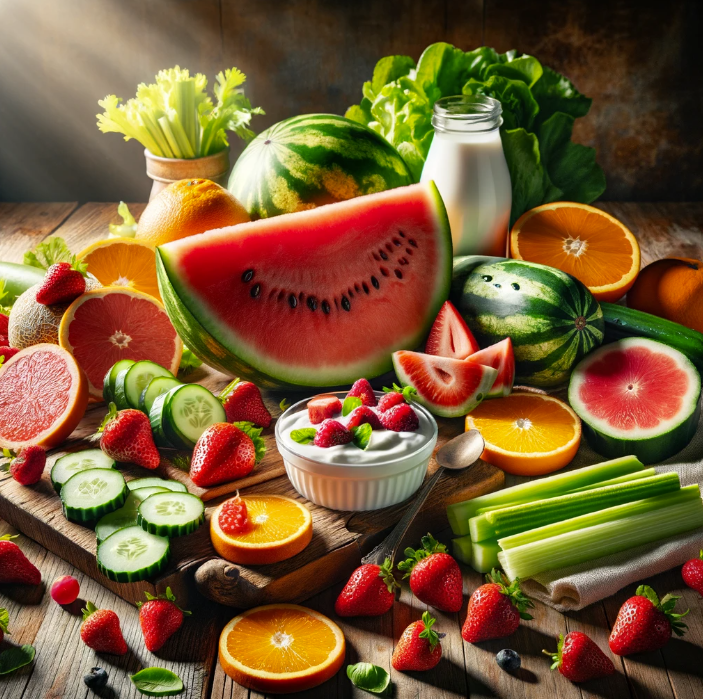
While drinking water is vital, consuming water-rich foods can provide an additional hydration boost along with nutrients that benefit the skin. Examples include:
- Cucumber (96% water): Cucumber is an excellent hydrating food due to its high water content. It’s also rich in silica, a mineral that promotes skin elasticity, helping to keep the skin firm and youthful-looking.
- Watermelon (92% water): Watermelon is packed with lycopene, a powerful antioxidant known for its ability to protect the skin from UV damage and reduce signs of aging. The high water content helps to keep the skin hydrated, while lycopene fights free radicals.
- Oranges (88% water): Oranges are not only hydrating but also a great source of vitamin C, which plays a crucial role in the synthesis of collagen, a protein that gives the skin its firmness and strength. Vitamin C also helps brighten the skin and reduce pigmentation.
- Spinach (93% water): Spinach is a nutrient powerhouse, rich in vitamins A and E, both of which are essential for skin repair and hydration. Vitamin A promotes skin cell turnover, while vitamin E acts as a potent antioxidant that protects the skin from oxidative stress and dryness.
- Strawberries (91% water): Strawberries are loaded with ellagic acid, a compound that helps prevent the breakdown of collagen in the skin, preserving its structure and elasticity. The high water content helps maintain skin hydration, while the ellagic acid offers anti-aging benefits.
Incorporating these foods into your diet complements water intake, offering dual benefits of hydration and skin-enhancing nutrients.
The Role of Electrolytes in Hydration
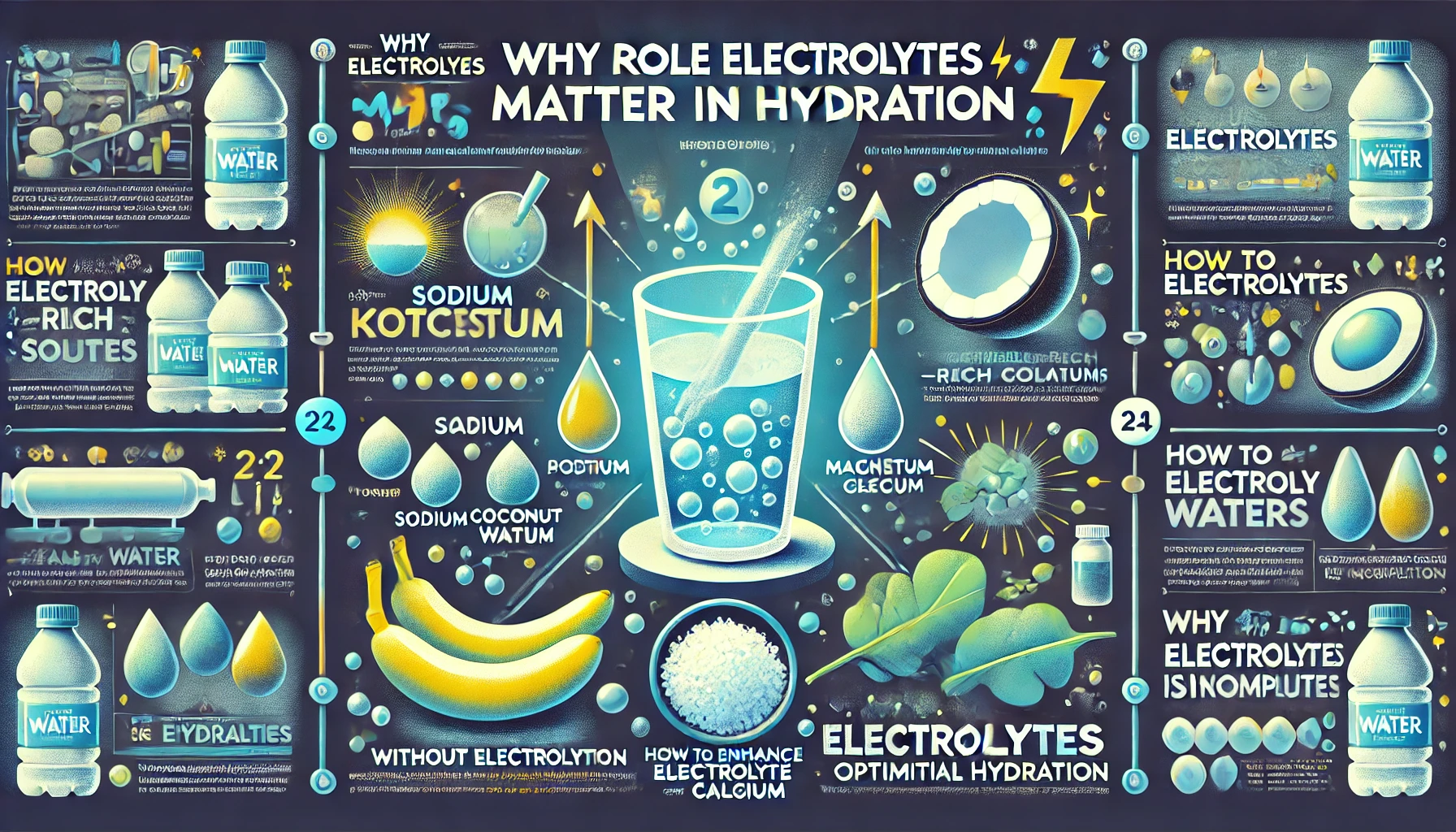
Electrolytes are essential minerals—sodium, potassium, magnesium, and calcium—that carry an electric charge. They are vital for maintaining fluid balance, muscle function, and nerve signaling in the body. Their role in hydration is particularly crucial because they help regulate how water is absorbed and distributed across cells, tissues, and organs. Without adequate electrolytes, your body may struggle to retain and utilize the water you consume, leading to suboptimal hydration.
1. Why Electrolytes Matter for Hydration
1. Water Distribution Across Cells
Electrolytes control the movement of water between cells and their surrounding environment. This process, known as osmosis, ensures that each cell gets the right amount of water for proper functioning.
- Sodium and potassium work together to balance water inside and outside the cells. Sodium pulls water into the bloodstream, while potassium helps water enter the cells.
- Magnesium supports cellular hydration by stabilizing cell membranes and enabling other electrolytes to function effectively.
- Calcium contributes to fluid retention and muscle contractions, indirectly influencing hydration levels.
If electrolyte levels are imbalanced (e.g., due to sweating, illness, or poor diet), water may not be distributed evenly, leaving some cells dehydrated while others retain too much fluid.
2. Preventing Dehydration
When you sweat, your body loses both water and electrolytes, particularly sodium and potassium. Replenishing only water without electrolytes can dilute these minerals in your bloodstream, leading to a condition called hyponatremia (low sodium levels). Symptoms include fatigue, muscle cramps, and confusion.
To stay truly hydrated, it’s essential to replace both water and electrolytes, especially during intense physical activity or in hot climates.
3. Supporting Skin Hydration
Electrolytes also play a direct role in maintaining your skin’s hydration and barrier function:
- Sodium and potassium help maintain skin moisture balance, preventing excessive dryness or oiliness.
- Magnesium reduces inflammation, supports cell repair, and improves the skin’s ability to retain water.
- Calcium contributes to skin renewal and strengthens the protective barrier, reducing water loss through the epidermis.
2. How to Enhance Hydration with Natural Electrolyte Sources
You don’t need sports drinks or supplements to get electrolytes; natural sources are often more effective and healthier. Here are some simple ways to boost electrolyte levels:
1. Coconut Water
- Rich in potassium and magnesium, coconut water is a natural, low-sugar alternative to commercial electrolyte drinks. It’s particularly effective after exercise or on hot days.
2. Bananas
- Bananas are a potassium powerhouse, making them an excellent choice for maintaining hydration balance. They’re also convenient and versatile as a snack or smoothie ingredient.
3. Sea Salt
- Adding a pinch of sea salt to your water enhances sodium and trace mineral content, helping your body retain water and improve overall hydration.
4. Leafy Greens
- Vegetables like spinach and kale provide magnesium, calcium, and potassium, supporting hydration while offering additional vitamins and antioxidants for skin health.
5. Citrus Fruits
- Oranges, lemons, and limes are not only hydrating but also packed with potassium and vitamin C, which supports collagen production for better skin elasticity.
3. Why Hydration Without Electrolytes Is Incomplete
Drinking water alone may not sufficiently hydrate your cells if electrolyte levels are low. Without the right balance of electrolytes, your body struggles to retain and use the water efficiently, leading to symptoms of dehydration despite adequate fluid intake.
Key Insight:
Electrolytes act as “hydration activators,” ensuring water reaches the right places in the body. Think of them as keys that unlock cellular hydration.
Hydration and the Skin Microbiome
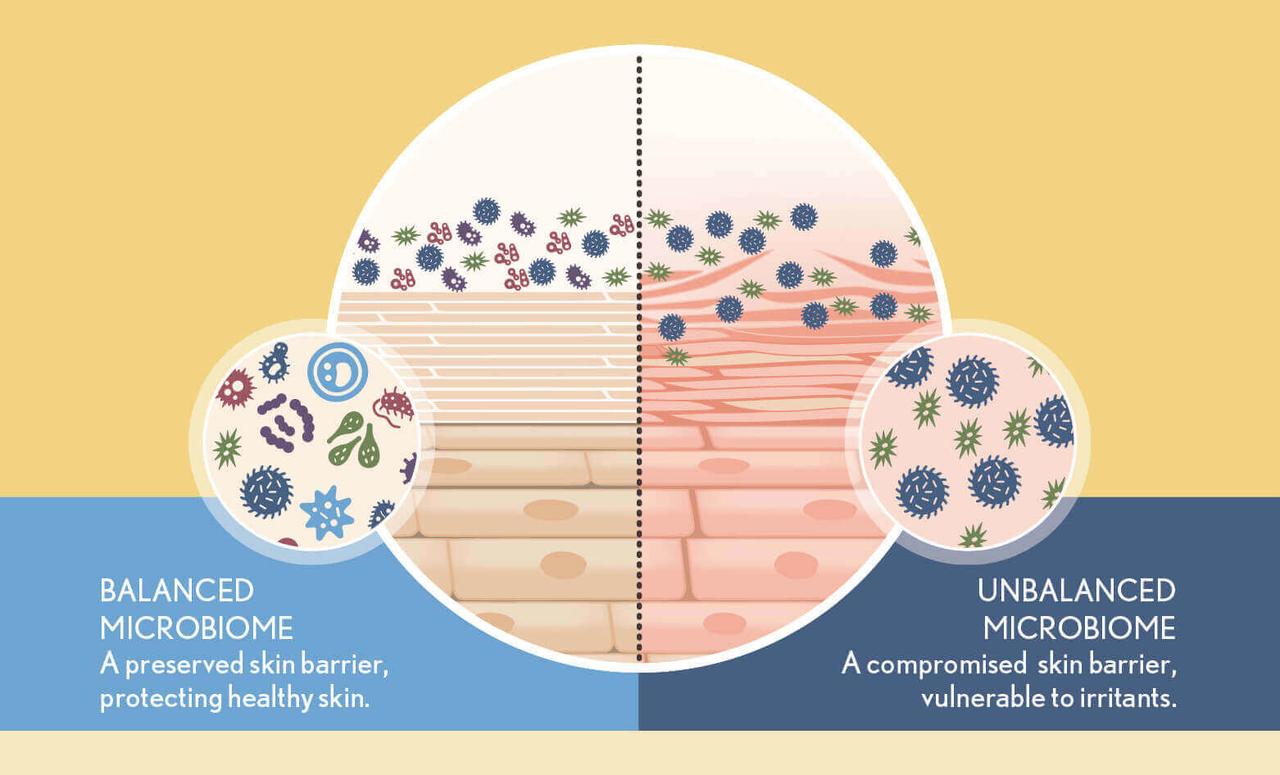
The skin microbiome is a complex ecosystem of beneficial microorganisms that live on the skin’s surface, playing a crucial role in maintaining its health and protective functions. This delicate balance is influenced by hydration levels, with dehydration negatively impacting the microbiome and overall skin health.
When the skin is dehydrated, its barrier becomes compromised, creating an environment where harmful microbes can thrive while beneficial ones diminish. This imbalance, known as dysbiosis, increases inflammation, sensitivity, and susceptibility to conditions like eczema, acne, and rosacea.
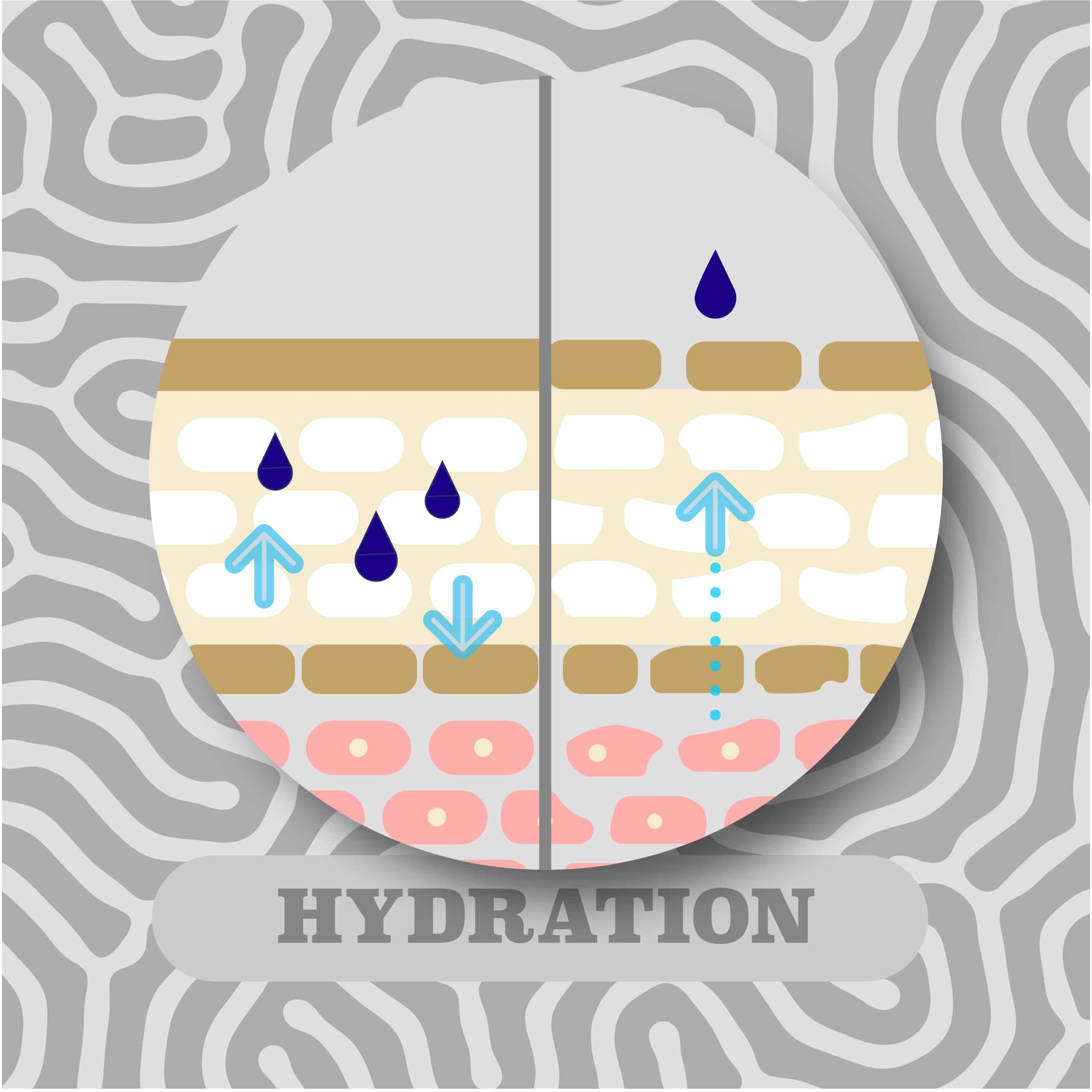
Key Insight:
A 2021 study published in Nature Reviews Microbiology highlights that well-hydrated skin promotes a diverse and stable microbiome. A rich microbial diversity strengthens the skin’s natural defenses, reduces inflammatory responses, and improves its ability to heal and repair damage. Furthermore, a hydrated skin barrier is less likely to lose water through transepidermal water loss (TEWL), maintaining a healthier environment for these microorganisms.
Maintaining hydration through drinking water and using topical moisturizers that support barrier function is essential for fostering a balanced microbiome. This synergy between hydration and microbiome health plays a pivotal role in achieving resilient, glowing skin.
Why Drinking Water Alone Isn’t Enough
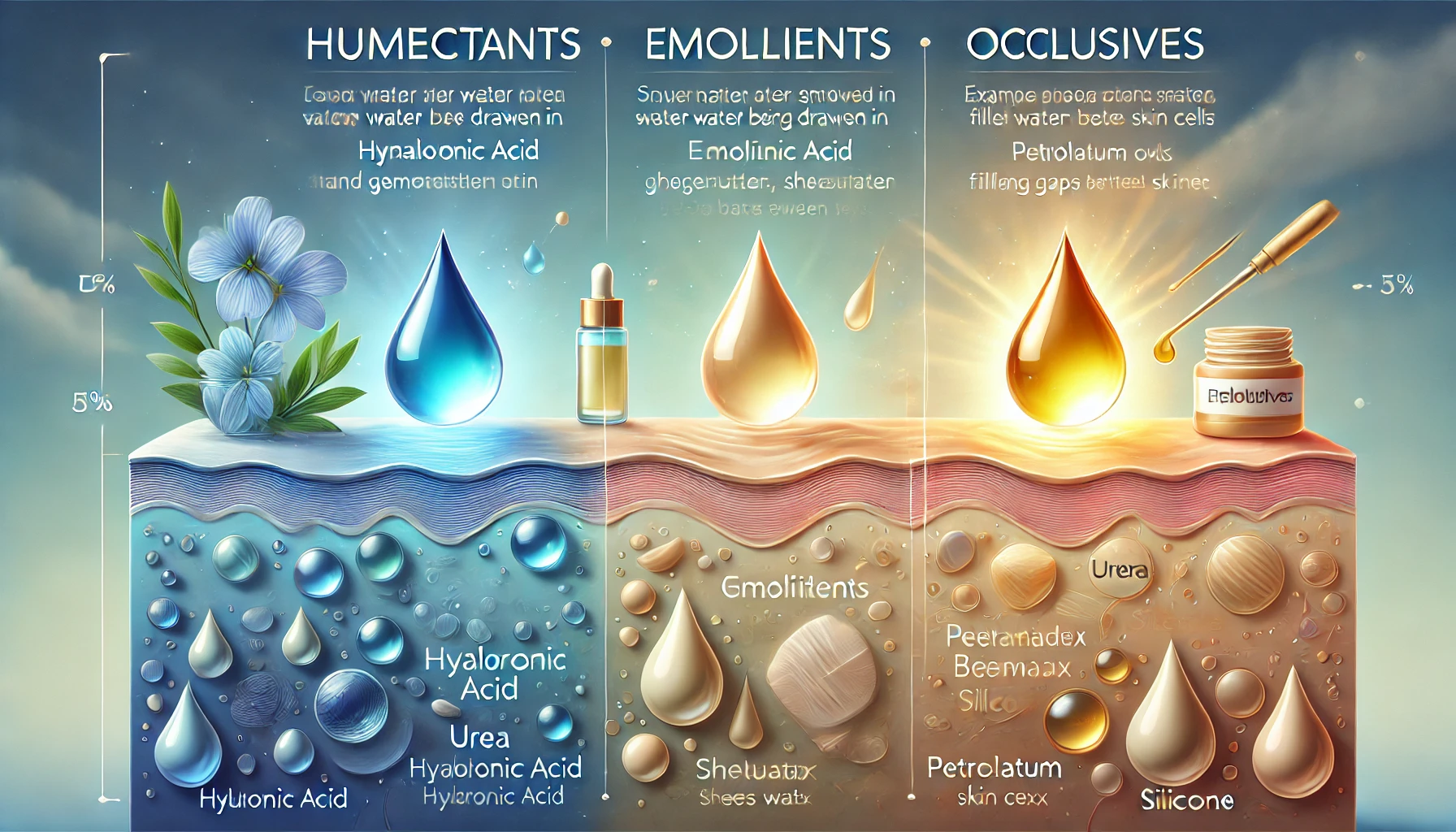
Drinking water is crucial for internal hydration, but it doesn’t directly address the skin’s external moisture needs. The outermost layer of the skin, the stratum corneum, relies on a healthy moisture barrier to retain hydration and prevent water loss. Without proper external care, the water you consume may not fully benefit your skin’s surface.
Key Topical Hydration Components
- Humectants
- What They Do: Attract and bind water from the environment or deeper skin layers to the skin’s surface.
- Examples: Hyaluronic acid, glycerin, and urea.
- Why They Matter: Keep the skin plump, hydrated, and smooth.
- Emollients
- What They Do: Fill in gaps between skin cells, softening and smoothing the skin.
- Examples: Plant oils, shea butter, and ceramides.
- Why They Matter: Strengthen the skin’s barrier and enhance texture.
- Occlusives
- What They Do: Form a protective layer over the skin, locking in moisture and preventing transepidermal water loss (TEWL).
- Examples: Petrolatum, beeswax, and silicone.
- Why They Matter: Seal hydration in, especially for dry or sensitive skin.
The Synergistic Effect
By pairing internal hydration (drinking water) with topical care, you create a holistic approach to skin hydration:
- Water replenishes skin cells from within.
- Skincare products maintain moisture on the surface, protect against environmental stressors, and prevent water loss.
This combination ensures optimal hydration for a radiant and healthy complexion.
Environmental Factors and Hydration
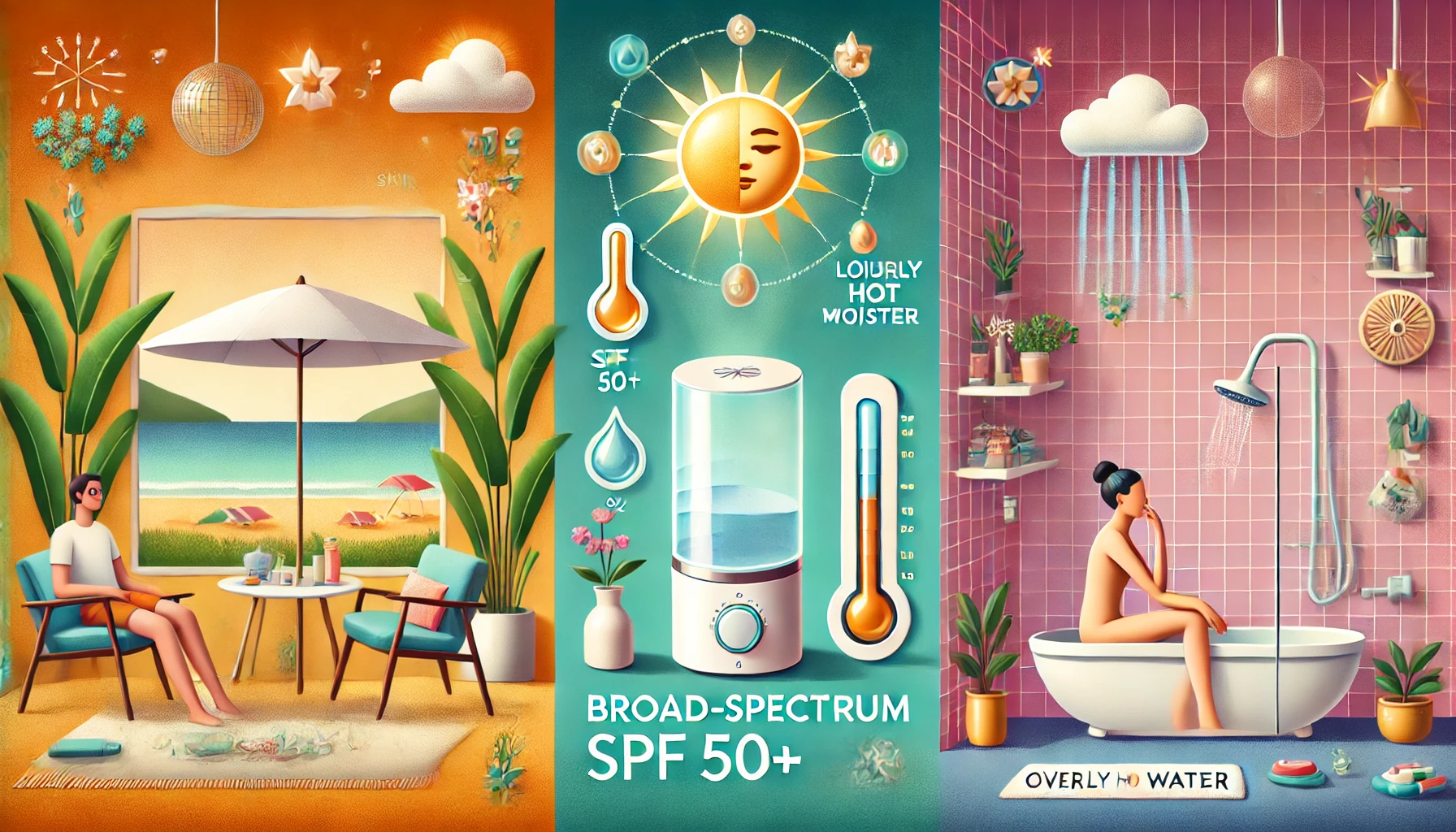
External factors such as pollution, UV rays, and low humidity can significantly dehydrate your skin, leaving it dry, dull, and prone to damage. Adopting simple strategies can help mitigate these effects and maintain skin hydration.
- Use Broad-Spectrum Sunscreen: UV rays break down the skin barrier, increasing water loss. A good sunscreen not only prevents sunburn but also locks in moisture and protects your skin from long-term damage.
- Install a Humidifier: Dry indoor environments, especially with air conditioning or heating, strip moisture from the air and your skin. A humidifier helps maintain a healthy humidity level, keeping your skin hydrated and supple.
- Avoid Overly Hot Showers: Hot water strips natural oils that form a protective layer on your skin, leading to increased dryness. Opt for lukewarm water to cleanse without compromising your skin’s hydration.
By addressing these environmental factors, you can preserve your skin’s moisture levels and support overall hydration for a healthier complexion.
Water and Aging: The Long-Term Benefits
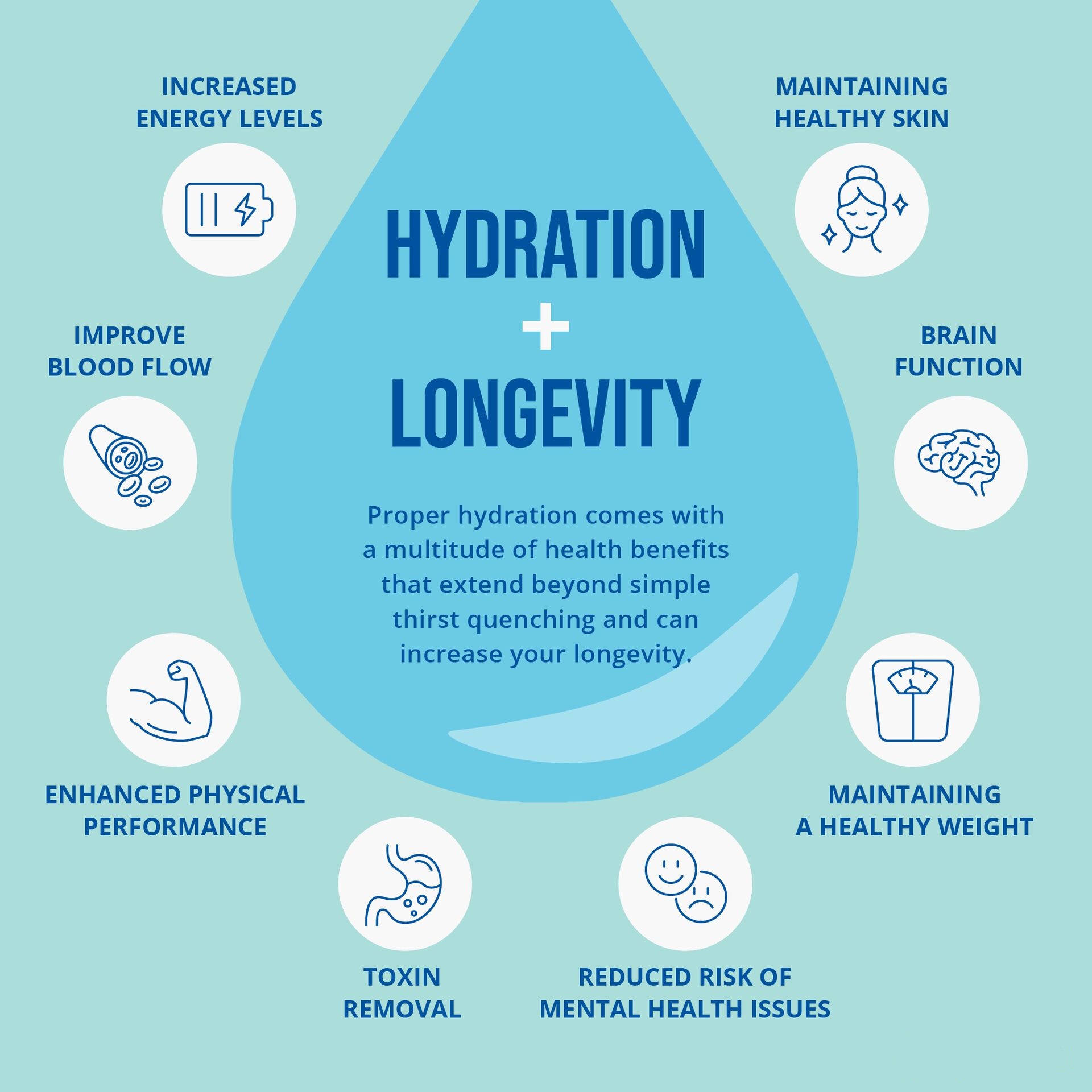
Dehydration is a subtle but significant factor in premature skin aging. When the body lacks adequate hydration, it accelerates the breakdown of collagen and elastin, the structural proteins responsible for maintaining skin’s firmness and elasticity. Over time, this depletion contributes to sagging skin, the formation of fine lines, and deeper wrinkles, making skin appear older than it actually is.
Adequate hydration supports the skin’s ability to repair itself and maintain elasticity by promoting proper blood flow and delivering essential nutrients to skin cells. It also helps flush out toxins, reducing oxidative stress—a key contributor to aging.
Scientific studies reveal that individuals with consistently high water intake show fewer and slower-developing signs of skin aging, such as reduced wrinkle depth and better skin elasticity, compared to those who are chronically dehydrated. Drinking enough water is, therefore, a simple and effective way to preserve a youthful appearance and protect your skin from premature aging.
Actionable Steps for Better Skin Hydration
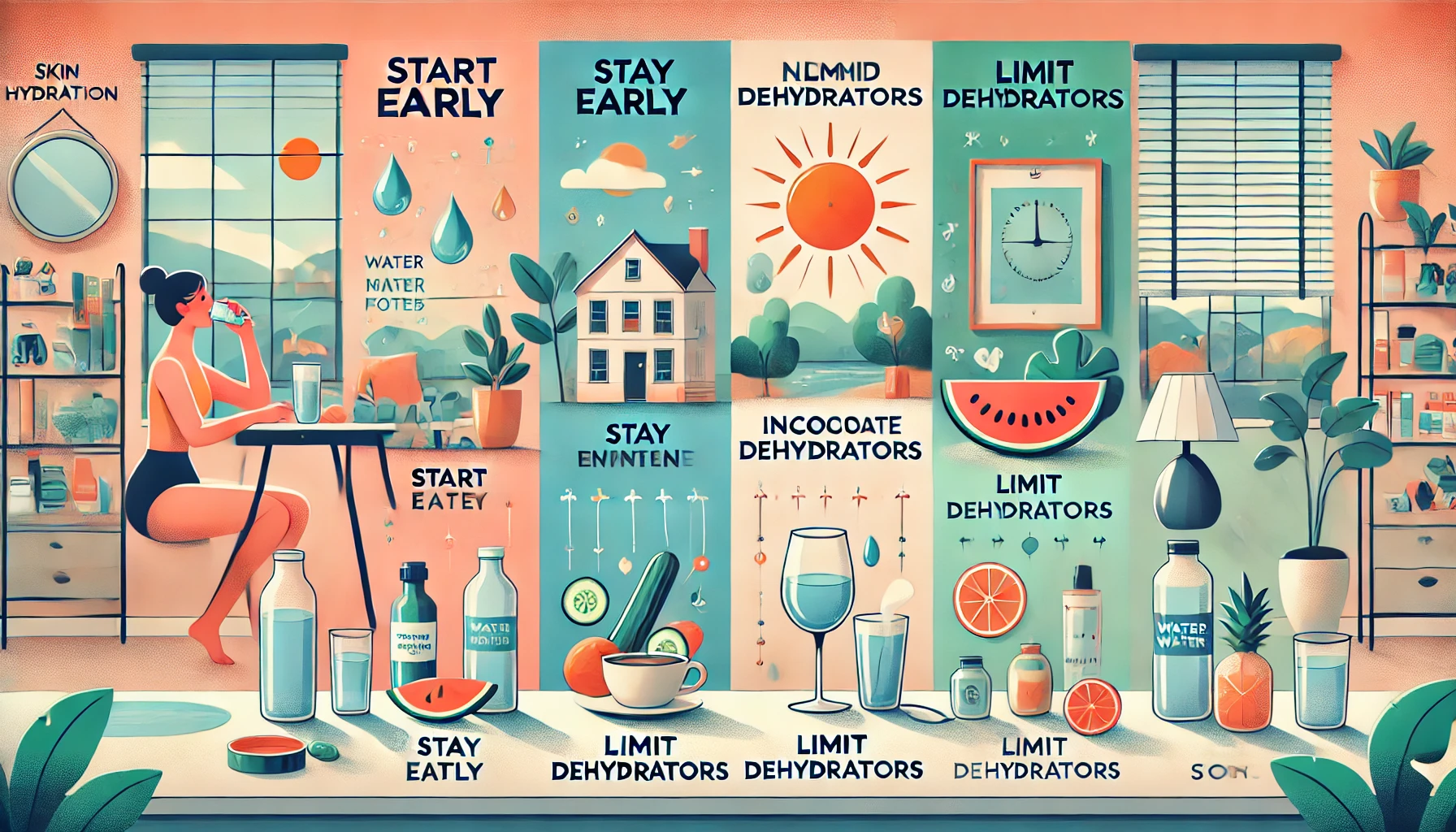
1. Start Early: Begin Your Day with a Glass of Water to Rehydrate After Sleep
During sleep, the body naturally loses water through respiration and perspiration. By the time you wake up, you are likely mildly dehydrated. Starting your day with a glass of water helps replenish the fluid lost overnight and jumpstarts your body’s hydration processes.
How to Implement This:
- Keep a glass or bottle of water by your bedside as a reminder.
- If plain water feels unappealing, add a slice of lemon or cucumber for a refreshing flavor and additional nutrients.
- Warm water with a teaspoon of honey can also help soothe digestion while hydrating.
Why It Matters:
Morning hydration aids in flushing out toxins accumulated overnight, improving blood circulation to the skin and giving it a healthy, fresh appearance.
2. Stay Consistent: Drink Small Amounts Throughout the Day Rather Than All at Once
While drinking water is essential, consuming large quantities at once isn’t effective because your body can only absorb a limited amount at a time. Excess water is quickly expelled through urine, which can lead to inefficient hydration.
How to Implement This:
- Use a water-tracking app or a reusable water bottle with marked time indicators to encourage steady intake.
- Set reminders on your phone to take a sip every hour.
- Swap sugary beverages for water infused with fruits or herbs for variety.
Why It Matters:
Consistent hydration ensures a continuous supply of water to the cells, maintaining their plumpness and functionality, which directly benefits skin texture and elasticity.
3. Incorporate Hydration Foods: Make Water-Rich Fruits and Vegetables a Staple in Your Diet
Water-rich foods provide a dual benefit: hydration and nutrients essential for skin health. Unlike plain water, these foods are packed with vitamins, antioxidants, and minerals that support collagen production, reduce inflammation, and protect against environmental damage.
Examples of Hydration Foods:
- Fruits: Watermelon, oranges, strawberries, cantaloupe, and grapefruit.
- Vegetables: Cucumber, celery, zucchini, spinach, and lettuce.
- Other Options: Soups, broths, and smoothies made with hydrating ingredients.
How to Implement This:
- Snack on fruits like cucumber slices or watermelon cubes.
- Add greens like spinach to salads or smoothies.
- Include soups or broths in your meal plan, especially during colder months.
Why It Matters:
These foods enhance hydration while providing skin-boosting nutrients like vitamins C and A, which promote collagen production and repair damage caused by free radicals.
4. Limit Dehydrators: Reduce Consumption of Caffeine and Alcohol, Which Promote Water Loss
Both caffeine and alcohol act as diuretics, increasing urine output and leading to dehydration. While moderate consumption may not severely impact hydration, excessive intake can strip your skin of its moisture, making it appear dull and dry.
How to Implement This:
- For every cup of coffee or glass of wine, drink an additional glass of water to counteract dehydration.
- Opt for herbal teas or decaffeinated beverages instead of multiple cups of coffee.
- Limit alcoholic drinks to one or two servings per occasion and pair them with hydrating mixers like soda water or juice.
Why It Matters:
Reducing dehydrators helps maintain your skin’s natural moisture levels, reducing fine lines and wrinkles caused by dehydration.
5. Adopt a Holistic Approach: Combine Drinking Water with a Robust Skincare Routine and Environmental Adjustments
While drinking water hydrates from within, pairing it with external strategies ensures optimal skin hydration. Environmental factors and topical care play a vital role in preserving the skin’s moisture barrier.
Skincare Recommendations:
- Cleanse Gently: Use hydrating cleansers that don’t strip natural oils.
- Moisturize: Apply a moisturizer with humectants (e.g., hyaluronic acid, glycerin) to lock in hydration.
- Sunscreen: Protect your skin from UV rays, which can exacerbate moisture loss.
- Nighttime Care: Use overnight masks or creams to replenish hydration while you sleep.
Environmental Adjustments:
- Humidifiers: Use them in dry or air-conditioned environments to maintain moisture in the air.
- Avoid Hot Showers: Use lukewarm water to prevent stripping your skin of natural oils.
- Protective Clothing: Wear hats and scarves in harsh weather to shield your skin from drying winds.
Why It Matters:
A holistic approach creates a balance between internal hydration and external care, ensuring your skin stays nourished, hydrated, and resilient against environmental stressors.
Conclusion
Hydration is the cornerstone of vibrant, healthy skin. Drinking water revitalizes your skin from within, improving elasticity, calming inflammation, and enhancing its natural radiance. By embracing the science of skin hydration and incorporating mindful practices into your daily routine, you can unlock a glowing, youthful complexion that reflects true wellness. For expert insights and the most accurate skincare information, explore aayushii.com—your ultimate guide to achieving your best skin.
The path to healthier, more beautiful skin might just begin with a simple yet powerful act—raising a glass of water. Start today, and let your skin thank you tomorrow.
FAQ: How Drinking Water Transforms Your Skin
1. How does drinking water impact skin health?
- Drinking water hydrates skin cells from the inside, improving their elasticity and function. Proper hydration enhances blood flow, supports toxin removal, and maintains the skin’s moisture balance, resulting in a more radiant and healthy complexion.
2. Can drinking water alone improve my skin?
- While drinking water is crucial, it’s not a standalone solution. Combining internal hydration with external care—such as moisturizers, sunscreen, and a balanced diet—maximizes skin health by addressing both internal and external hydration needs.
3. How much water should I drink for healthy skin?
- Hydration needs vary based on factors like body weight, activity level, and climate. A general guideline is to drink 30–40 ml of water per kilogram of body weight. For most adults, this translates to 2–3 liters daily, but listen to your body’s thirst cues and monitor urine color (light yellow indicates proper hydration).
4. Can dehydration cause wrinkles?
- Yes, dehydration accelerates the breakdown of collagen and elastin, leading to sagging skin and wrinkles over time. Proper hydration helps maintain these proteins, preserving skin firmness and delaying visible signs of aging.
5. What are some signs of dehydrated skin?
- Dehydrated skin often feels tight, appears dull, and may show fine lines. Other signs include flakiness, uneven texture, and increased sensitivity. Addressing these symptoms involves drinking water and using hydrating skincare products with humectants like hyaluronic acid.
6. Are there specific times of day to drink water for better skin?
- Yes, start your day with a glass of water to rehydrate after sleep. Drinking consistently throughout the day, rather than all at once, ensures steady hydration. Avoid excessive water intake close to bedtime to prevent interruptions to your sleep.
7. Can other beverages replace water for skin hydration?
- While water is the most effective, other beverages like herbal teas or natural coconut water can contribute to hydration. However, avoid sugary drinks and excessive caffeine or alcohol, as they can dehydrate your skin and body.
8. How does water interact with topical skincare?
- Drinking water supports skin hydration at the cellular level, while topical products lock in moisture on the skin’s surface. Using humectants, emollients, and occlusives alongside drinking water creates a synergistic effect, ensuring optimal hydration and a radiant complexion.
9. Can drinking water help with acne?
- Yes, proper hydration aids in toxin removal and reduces oil overproduction, both of which can contribute to clearer skin. While water alone isn’t a cure for acne, it supports other treatments and helps improve overall skin health.
10. What role do electrolytes play in skin hydration?
- Electrolytes like sodium, potassium, and magnesium regulate water distribution in the body. Without them, the water you drink may not adequately hydrate your cells, including those in the skin. Incorporate natural electrolyte sources, such as coconut water or bananas, into your diet to optimize hydration.



